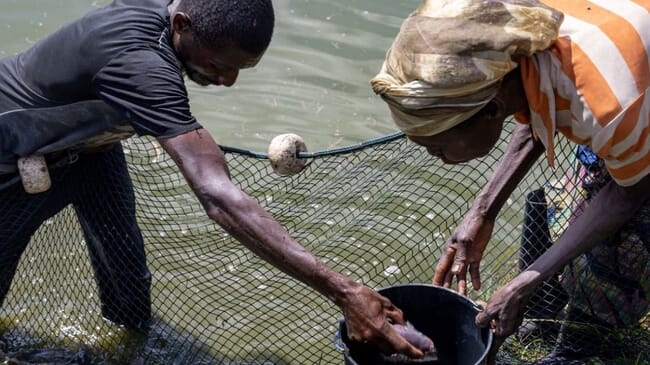
© International Fund for Agricultural Development
Angola overly depends on crude oil, which represents 93 percent of its exports. Low productivity and meagre opportunities in other economic sectors have left a third of the population below the poverty line. Fluctuating oil prices underscore the need to diversify the country’s economy and exports.
“The fisheries and aquaculture sector can help Angola diversify its economy and move closer to achieving its development goals,” said Paul Akiwumi, director of UNCTAD’s division for Africa and least developed countries.
He said Angola can create more jobs, trade opportunities, boost food security, improve livelihoods and reduce poverty by tapping more into the blue economy.
UNCTAD says that it is supporting Angola to build a sustainable, resilient and inclusive blue economy through its EU-UNCTAD Joint Programme for Angola: Train for Trade II.
The programme works on mutually supportive economic policy areas simultaneously, including development of green and creative sectors’ value chains, transport, investment, entrepreneurship, trade policy and trade facilitation.
With European Union funding, UNCTAD has so far trained 2,700 government officials, private sector, academia and civil society stakeholders on how to address the constraints facing Angola’s fisheries and aquaculture sector.
For example, UNCTAD argues that Angola needs to assess fish stocks to get the data needed to effectively control fishing activities and establish total allowable catch, which helps to ensure sustainability. Enterprises and fishers need to learn modern fisheries techniques and sharpen their entrepreneurial skills. Fisheries must also meet both national and international safety and quality requirements.
Jorge Quituta, director general of Jorana, a fisheries firm in Angola, said capacity-building will enable the private sector to contribute more to the country’s blue economy.
He said the sector’s role is currently “very weak”, noting that stakeholders need better guidance, technical and scientific knowledge and practical skills. “UNCTAD’s support in this regard has been indispensable, and we hope to receive more assistance in the future,” he added.
Through its flagship capacity-building programme, Empretec, UNCTAD has equipped trainers in the country to conduct entrepreneurial training to firms operating in fisheries, tropical fruits and honey sectors.
In October 2022, UNCTAD organized a training workshop during which Angolan fisheries stakeholders learned from their counterparts in Viet Nam, one of the top three global seafood exporters thanks to determined policy, capacity-building and investment efforts.
In May 2023, UNCTAD and the International Standardization Organization (ISO) trained 50 Angolan stakeholders on how they can meet the international standards required to increase fish exports to more lucrative markets in Asia, Europe and the United States.
Through these training workshops, Angolan authorities and other stakeholders assessed gaps and developed action plans for catching the rising wave of opportunities in the fisheries and aquaculture sector.



